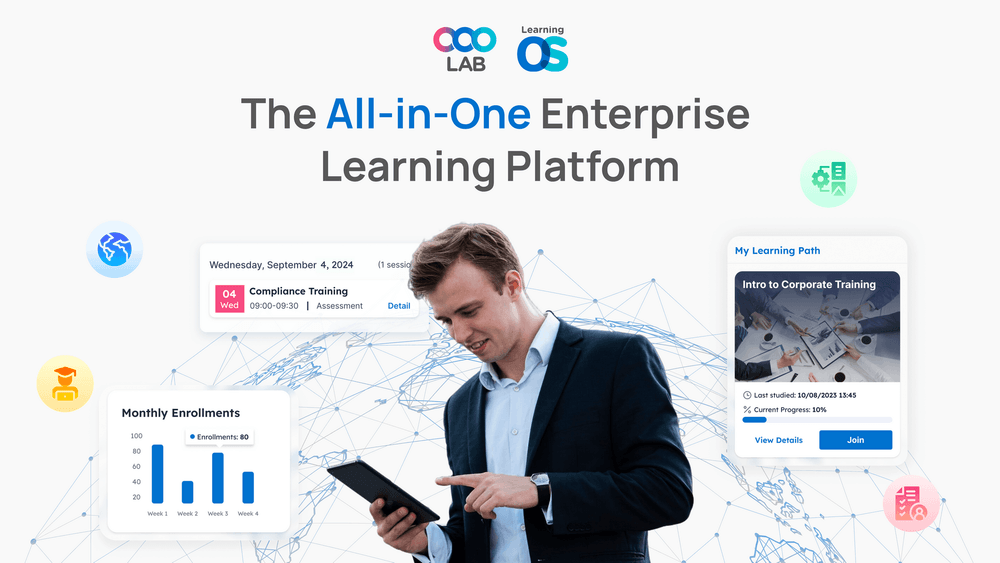

Sales enablement is about providing sales teams with the tools, training, and content they need to sell effectively. One of the most powerful and engaging training methods is role-playing. This hands-on approach helps sales representatives refine their communication, negotiation, and objection-handling skills in a controlled environment before applying them in real-world situations.
By integrating role-playing into sales training, companies can accelerate the learning curve, build confidence, and enhance the overall performance of their sales teams. This blog explores the key benefits of role-playing in sales training, its impact on sales enablement goals, and how Enterprise LMS platforms can support this training method for maximum effectiveness.

Role-playing in sales training is a simulation-based learning technique where sales professionals practice real-life sales conversations in a structured setting. The process typically involves:
A sales representative acting as the seller
A trainer or colleague playing the role of a customer
A structured scenario that mimics common sales situations, such as pitching a product, handling objections, or closing a deal
This interactive approach helps sales teams develop skills, gain confidence, and receive constructive feedback, making it one of the most effective sales training methods.
>>> Read more: Sales Training Demystified: Why It Matters More Than Ever
>>> Read more: Effective Onboarding Strategies for New Sales Hires: Setting Them Up for Success
Sales enablement focuses on equipping sales teams with knowledge, skills, and resources to close deals effectively. Role-playing directly contributes to sales enablement in the following ways:
Sales reps must be able to clearly articulate value propositions and persuade potential buyers. Role-playing exercises provide a safe space to practice and refine these skills without the pressure of a real sales call.
A study by McKinsey found that effective sales communication can increase conversion rates by up to 20%.
By regularly engaging in sales training role-plays, reps become more comfortable with product messaging, customer interactions, and objection handling.
Many sales professionals experience anxiety when dealing with tough customers or high-stakes negotiations. Role-playing simulates these situations in a controlled environment, allowing reps to build confidence before facing actual buyers. Repetition and feedback help sales reps:
Develop natural conversational flow
Reduce nervousness in high-pressure scenarios
Build a resilient mindset for handling rejection
Customers often raise objections during the sales process. Role-playing helps sales reps practice responding to common objections effectively and persuasively. Examples of objections covered in training:
"Your product is too expensive." → Sales reps learn to demonstrate value and ROI.
"I'm happy with my current provider." → Reps practice differentiating their offering.
"I need more time to decide." → Reps refine follow-up strategies.
Research from Harvard Business Review shows that salespeople who effectively handle objections increase deal closure rates by 27%.
Role-playing sessions help sales reps internalize sales methodologies such as:
Solution selling: Focusing on customer needs rather than just product features
Challenger sales: Teaching prospects new perspectives
Consultative selling: Building trust and long-term relationships
By practicing these approaches, reps develop muscle memory, making it easier to apply techniques in real sales conversations.
Incorporating peer feedback in role-playing sessions enables sales reps to learn from each other’s strengths and mistakes. Observing colleagues handle different scenarios can inspire new techniques and improve overall team performance. Using an Enterprise LMS for role-playing exercises allows trainers to:
Record sessions for review
Provide detailed performance analytics
Offer personalized feedback based on AI-driven insights
Book Free Demo with us. Bring your Training and Learning to a new height with LearningOS.

>>> Read more: Building Confidence in Your Sales Team Through Training and Development
>>> Read more: Addressing declining retail foot traffic issue
For role-playing to be effective, sales reps must engage in realistic, high-impact scenarios that reflect actual sales challenges. Customizing role-play scripts to align with industry trends and customer pain points enhances engagement and relevance. Examples of real-world scenarios:
Cold calling a prospect
Conducting a product demo
Handling a difficult client negotiation
Modern Enterprise LMS platforms offer AI-driven simulations where sales reps can interact with virtual customers powered by AI. These tools provide:
Instant feedback on tone, pacing, and language
Adaptive learning paths based on performance
Scalable training for global sales teams
According to a report from Gartner, AI-driven sales training tools increase skill retention by 35% compared to traditional methods.
Sales training should be an ongoing process, not a one-time event. Scheduling weekly or monthly role-playing sessions helps sales teams continuously improve. Recommended formats:
One-on-one coaching with managers
Team-based role-play exercises
Self-paced practice using LMS video recording tools
Adding a gamification element to role-playing increases participation and engagement. Consider:
Leaderboards for top-performing sales reps
Rewards for mastering sales objections
Certificates for completing different role-play levels
Gamification makes learning fun while reinforcing essential skills.
Tracking performance metrics ensures that role-playing exercises lead to measurable improvements in sales effectiveness. Use an Enterprise LMS to collect data on:
Win rates before and after training
Objection-handling success rates
Time-to-close metrics
This data helps optimize training strategies and tailor role-playing scenarios to the most common challenges sales reps face.
>>> Read more: A guide to teaching sales rep positive response
>>> Read more: Why is employee upskilling non-negotiable for business success
Role-playing is a highly effective sales training technique that strengthens sales enablement efforts. By simulating real-life interactions, sales reps build confidence, communication skills, and objection-handling abilities—all crucial for closing deals successfully.
With the integration of Enterprise LMS platforms, companies can scale role-playing exercises, track performance, and provide personalized coaching to sales teams. Investing in interactive sales training ensures that reps are well-prepared, adaptable, and consistently improving their skills.
If you're looking to enhance your sales training program, consider incorporating role-playing sessions to develop a high-performing sales team ready to meet any challenge.
At OOOLAB (pronounced 'uːlæb'), our mission is to make complex learning operations simple. We aim to positively impact the lives of over 1,000,000 learners and educators by the end of 2026.
OOOLAB's LearningOS provides educational institutions and corporate enterprises with an all-in-one solution to create and deliver engaging learning experiences.
We meet organizations' needs or support your growth. We provide undivided attention. We provide:
1. Dedicated success manager: We offer direct communication with a real human who'll discuss your enterprises unique learning operations and goals.
2. Personalized setup: Our team will help you transition to LearningOS on your schedule, one step at a time.
3. Around the clock support: Get help from us any time, and in any time zone.
We have recently launched a new AI training tool, Skill Quotient OS, designed to elevate hybrid training to new heights. It offers role-play exercises with scenarios and assessments.This tool can apply in sales training, corporate development and customer support training in any industry.
Reach out to us at: LinkedIn, Facebook, Instagram, Tiktok, X
1. What are the main benefits of LearningOS
Our platform is easy to use and automates all aspects of your learning operations. It efficiently manages complex tasks, allowing you to concentrate on delivering exceptional learning experiences.
2. What main features does LearningOS offer?
Our all-in-one software solution combines a Content Management System, a Learning Management System, content authoring tools, and a mobile friendly Learner Portal.
3. Can your platform be used for corporate enterprises?
Absolutely! LearningOS is an Enterprise LMS that is a great fit for corporate learning. In fact, we have clients with up to 700,000 employees using LearningOS! Upskill your workforce by creating and assigning interactive eLearning content while effortlessly tracking employee progress.
4. Who currently uses your platform?
Our platform is currently used by over 120,000+ learners, parents, and employees across 21 countries worldwide!
5. What types of content options are available on your platform?
We offer ready-to-go curriculums for various educational purposes or our expert design team can build a custom course for you. We can also upload your existing learning materials and enhance them digitally.
6. What is unique about LearningOS?
Our platform, designed by educators for educators, provides you with all the tools you need to scale. Build and promote your own hybrid and blended learning courses and save money on licensing fees by owning your own proprietary content.
7. How can I get started?
Schedule a meeting with our experts and we’ll talk about how our platform can address your unique challenges and help to grow your business.